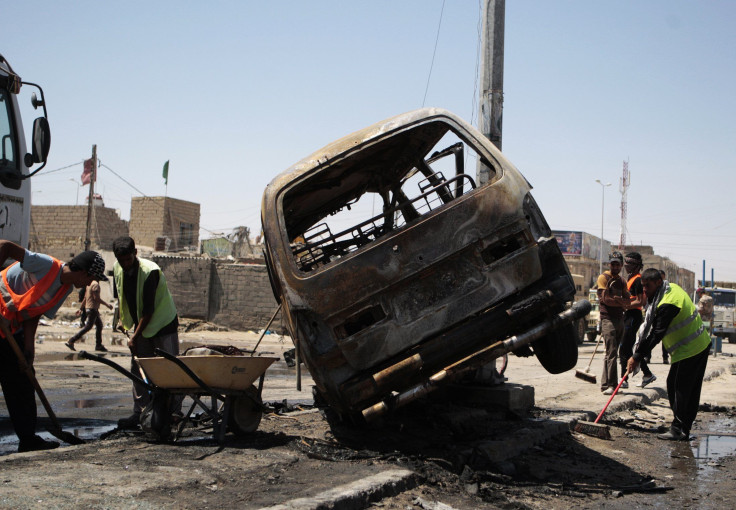60 Killed In Iraq Car Bombings; Al Qaeda-Led Attacks Threaten Full-Blown Intercommunal Conflict

Seventeen coordinated car bombings in Iraq on Monday left 60 dead, sending a wave of panic across a country that is already heavily divided through violence.
Since American forces left Iraq in 2011, the country has experienced great difficulty in containing insurgents from al Qaeda, with the latest attack taking place mostly in Shi'ite areas. The death toll, as measured by Iraq Body Count, has now reached 4,000 since the beginning of the year. More than 810 were killed in militant attacks in the month of July alone.
In Baghdad's Sadr city, where Shi'ites heavily populate the region, police and witnesses said a minivan approached a group of day laborers by the side of the road, with the driver telling them to get in before detonating an explosive device in the vehicle, Reuters reports.
"The driver asked laborers to get into the van, then he disappeared and minutes later the truck exploded, flinging the laborers' bodies back," said Yahya Ali, a worker who was standing nearby. "Somebody tell me please why poor laborers are targeted? They want only to take food to their families!"
The surge in violence has many afraid of intercommunal conflict between ethnic Kurds, majority Shi'ites, and Sunni Muslims completely reigniting, as the three groups have yet to find an effective way to share power.
"I am deeply concerned about the heightened level of violence which carries the danger that the country falls back into sectarian strife," said Gyorgy Busztin, acting United Nations envoy to Iraq. "Iraq is bleeding from random violence, which sadly reached record heights during the holy month of Ramadan."
Police said that 10 people were killed when two car bombs detonated by a bus station in the city of Kut, 95 miles southeast of the capital city. Many are attributing the surge of violence to the country's weakening security forces and resulting inability to contain al Qaeda.
"Today's attacks are closely linked with the Taji and Abu Ghraib prison breaks," Hakim Al-Zamili, a senior member of the security and defense committee in parliament, told Reuters. Al-Zamili argues these breaks "have encouraged terrorist groups to launch further attacks in areas of a specific sect to put more pressure on the government and undermine security force morale."
Sunnis represent a minority population in Iraq, and sources report the insurgents have been drawing from this increasingly embattled group following the 2003 toppling of Saddam Hussein's Sunni-led dictatorship.
A roadside bomb killed a senior police officer, his aide, and two guards 112 miles north of the capital on Monday. Five roadside bombs targeted a police patrol in Baghdad's Palestine Street, according to Reuters.
Published by Medicaldaily.com



























